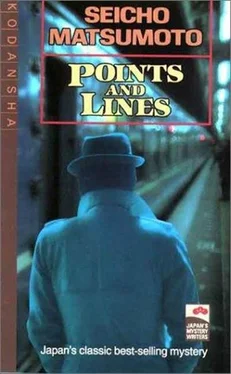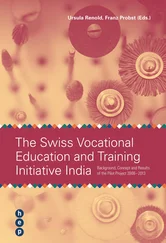Seichō Matsumoto - Points And Lines
Здесь есть возможность читать онлайн «Seichō Matsumoto - Points And Lines» весь текст электронной книги совершенно бесплатно (целиком полную версию без сокращений). В некоторых случаях можно слушать аудио, скачать через торрент в формате fb2 и присутствует краткое содержание. Жанр: Детектив, на английском языке. Описание произведения, (предисловие) а так же отзывы посетителей доступны на портале библиотеки ЛибКат.
- Название:Points And Lines
- Автор:
- Жанр:
- Год:неизвестен
- ISBN:нет данных
- Рейтинг книги:5 / 5. Голосов: 1
-
Избранное:Добавить в избранное
- Отзывы:
-
Ваша оценка:
- 100
- 1
- 2
- 3
- 4
- 5
Points And Lines: краткое содержание, описание и аннотация
Предлагаем к чтению аннотацию, описание, краткое содержание или предисловие (зависит от того, что написал сам автор книги «Points And Lines»). Если вы не нашли необходимую информацию о книге — напишите в комментариях, мы постараемся отыскать её.
Points And Lines — читать онлайн бесплатно полную книгу (весь текст) целиком
Ниже представлен текст книги, разбитый по страницам. Система сохранения места последней прочитанной страницы, позволяет с удобством читать онлайн бесплатно книгу «Points And Lines», без необходимости каждый раз заново искать на чём Вы остановились. Поставьте закладку, и сможете в любой момент перейти на страницу, на которой закончили чтение.
Интервал:
Закладка:
Mihara took out his notebook and went over his memo again. Yasuda had explained it in this way: Left Ueno on the twentieth by the express Towada and arrived at Aomori Station the morning of the twenty-first. Left Aomori at 9:50 on the Sei-kan ferry, arriving in Hakodate at 2:20. Left Hakodate by the express Marimo and arrived in Sapporo at 8:34. As he studied the memo a new idea came to him. Why hadn't he thought of it before? He remembered that on the Sei-kan ferry all the passengers had to register. That register could provide the evidence that would destroy Yasuda's alibi, for if the man had crossed on the ferry as he claimed, his name would have to appear in it.
Mihara tried to control his excitement, for he was still unsure. A month had gone by since January 21. Would the files still be available? The station officials would know, of course. He hurried to Sapporo Station and sought the office of the railway security police. Introducing himself, he asked if they could tell him how long the ferry registers were retained.
"The passenger registers for the Sei-kan ferry are kept for six months," he was informed by the officer on duty. He was immensely relieved.
"They are kept at Aomori, I presume," he said.
"Did the passengers get on at Aomori?"
"Yes."
"Then I don't believe you need to go all the way to Aomori. There should be a copy at Hakodate."
Mihara looked puzzled. "There are identical columns, A and B, on the passenger forms," the security officer explained. "The A section is filed at the port of arrival. In this case, Hakodate would have a copy."
Mihara nodded. He remembered entering the same information in both columns.
"What dates are you checking?" the security officer asked.
"January 21. The ferry that arrived in Hakodate at 2:20 P.M."
"That's No. 17. If you yourself are making the investigation, I'll telephone and ask the Hakodate ferry terminal to have the file ready to show you."
"I'd be grateful if you would. I'll take a train that gets to Hakodate early tomorrow morning."
There was one departing at 10:00 that evening. That meant eight hours to train time and another eight hours for the journey to Hakodate. Mihara walked the streets of Sapporo aimlessly, to kill time, his mind so filled with thoughts of Yasuda that he could remember nothing of what he saw.
It was six o'clock in the morning when he arrived at Hakodate. The wind was bitterly cold. Mihara impatiently waited two hours for the ferry official in charge to report to work.
He was an obliging young man. When he heard Mihara's request he rose at once to his feet. "I received word about this by telephone yesterday. I have the file you asked for. The one for No. 17 on January 21, isn't it?" He brought out several bundles of forms, held together by a piece of string.
"These are divided into second and third class. Which one do you need?"
"It would be the second class, I believe, but it could be the third."
Third class was the far bigger bundle, and it looked as though it would take him a long time to go through the pile. Second class amounted to less than thirty forms. Mihara decided to search through these first. As he looked at them, one by one, he kept saying to himself, Tatsuo Yasuda's name can't be here, it mustn't be here. On the twelfth or thirteenth form his eyes caught a familiar name: "Yoshio Ishida, government official, age 50, Tokyo…"
Yoshio Ishida, again, the division chief in the X Ministry- Mihara remembered only too well. Here was the man under suspicion, the one at the center of the scandal and on whom the 2nd Detective Section was concentrating its attention. Ishida had crossed to Hokkaido on this ferry! A gloomy premonition flashed through Mihara's mind.
He continued checking the forms carefully. He leafed through a few more, and, suddenly, he almost cried out in disappointment. It was there!
"Tatsuo Yasuda, machinery manufacturer, age 42, address: Tokyo…" It was unbelievable. It could not be possible, yet there it was, right before his eyes. Mihara caught his breath. With unsteady hands he took from his bag the guest register he had brought from the Marusō Inn and placed the two documents side by side. The signatures were identical. Yasuda had crossed on the ferry.
Since this was clear evidence he had been a passenger on the ferry, it followed that his presence on the Marimo express could also be proven. Yasuda had not lied. The crack in the wall Mihara thought he had discovered was an illusion. He felt crushed. Numb with disappointment, he sat staring at the piece of paper lying on the table in front of him.
11 The Stubborn Wall
Mihara took the streetcar to Shinjuku from in front of the Metropolitan Police Board. It was past eight o'clock and the evening rush hour was over. The streetcar was almost empty. He was able to sit comfortably and cross his legs. The rocking motion of the car was not unpleasant.
Mihara was fond of streetcars. Strange as it may seem, he liked to board one of them just for the ride, without a set destination in mind. And when some problem arose to trouble him, he often chose to sit in a streetcar while he gave it thought. The slow speed and the swaying motion helped him to think. He enjoyed best a streetcar that stopped often, and that started up each time with a rattle and a jerk. He would get on one and ride to the end of the line, immersed in his thoughts.
Just as he was doing today. He was turning over in his mind what Kawanishi had told him. Yasuda had sent the Futaba Company a wire, asking Kawanishi to meet him at Sapporo Station. Yet the business was not urgent. Why, then, did he do it? Why did he have to ask for a meeting at the station? Mihara felt sure he now knew the reason. Yasuda wanted the fact confirmed that he did actually arrive at Sapporo Station on the Marimo express. He wanted Kawanishi to see him there in order to establish an alibi. An alibi? But what for? Why want to prove he was in Sapporo? Why try to prove he was not somewhere else?
Mihara was getting at the truth of something which hitherto had eluded him. He had to conclude that there was only one place that Yasuda would seek to avoid: that was Kashii Beach in Kyushu. Yasuda wanted to prove that he was not there.
He got out the railway timetable that, now, he always carried in his pocket. Assuming that the double suicide took place between 10 and 11 on the night of January 20, the first available express train to Tokyo from Hakata after the incident was the Satsuma leaving at 7:24 the following morning. At 8:44 P.M. on the twenty-first, when Yasuda appeared at Sapporo Station in Hokkaido and greeted Kawanishi, the express Satsuma would have just left Kyoto Station. Yasuda wanted to make it unmistakably clear that he was not, that he could not have been, present at the scene of the double suicide. But why insist upon it?
"Pardon me." The conductor tapped Mihara's arm to arouse him. The streetcar had reached the end of the line. Mihara got off, still deep in thought. He walked for a while through the brightly lighted streets, then boarded another streetcar. This one was bound for Ogikubo.
Presently he started pursuing a new train of thought. Yasu-da's appearance at Sapporo Station threw new light on his actions at Tokyo Station. Until this moment, Mihara had assumed that Yasuda's purpose in having the two waitresses present at the station was to see Sayama and Otoki board the train together. He now believed there was another reason. Yasuda wanted eyewitnesses to testify that he, Yasuda, had no possible connection with the double suicide. It was he who called the waitresses' attention to Otoki getting on the train with a man, and the way he said it made it appear as if he were a mere bystander, as surprised as they were by the scene. Thus alerted, the two girls looked over and saw Sayama and Otoki sitting side by side in the super-express Asakaze at the start of the suicide journey, and Yasuda, of course, was not with them. Yasuda took the Yokosuka Line to Kamakura. This was his alibi. And to support it further, he appeared at the Koyuki Restaurant the following night and again the night after. It looked as though he were underscoring the point.
Читать дальшеИнтервал:
Закладка:
Похожие книги на «Points And Lines»
Представляем Вашему вниманию похожие книги на «Points And Lines» списком для выбора. Мы отобрали схожую по названию и смыслу литературу в надежде предоставить читателям больше вариантов отыскать новые, интересные, ещё непрочитанные произведения.
Обсуждение, отзывы о книге «Points And Lines» и просто собственные мнения читателей. Оставьте ваши комментарии, напишите, что Вы думаете о произведении, его смысле или главных героях. Укажите что конкретно понравилось, а что нет, и почему Вы так считаете.












